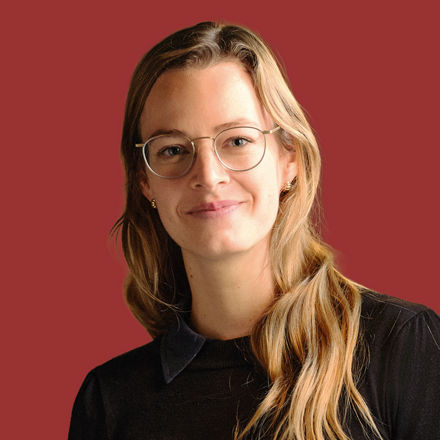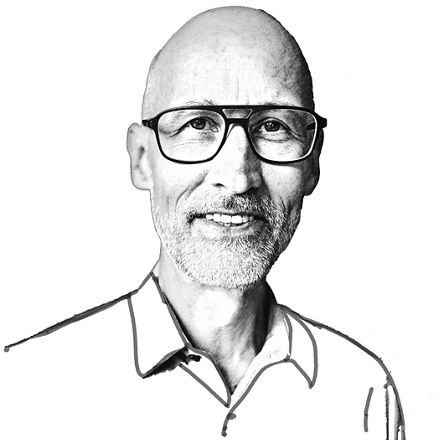Professor Latif, the delegates of the UN member states are currently meeting at the United Nations Climate Change Conference in Brazil. You have repeatedly expressed skepticism about such events. Are you following the conference?
Mojib Latif Of course I’m following it. After all, this is one of the few times these days when the issue of climate is brought into the public eye. But at the same time, I’m not expecting anything from it. There have already been 29 world climate conferences, and yet global greenhouse gas emissions have continued to rise—except during the time of the coronavirus.

Ms. Rapior, do you see it just as skeptically?
Myriam Rapior The assessments are correct, Mr. Latif, but we must remain optimistic. It’s important to keep reminding people and saying that we can still manage to limit the global temperature rise to 1.5 degrees. Although many environmental trends are pointing downwards, we have to keep at it and try to create positive momentum. If we no longer believe in the climate turnaround, then no one will believe in it.

Latif That’s true. But the climate agreement that was concluded in Paris ten years ago has de facto collapsed. This has nothing to do with pessimism, but with physics. Even if we do everything humanly possible now, we will exceed a global warming of two degrees. However, I am not one to talk about tipping points. Even if we do not achieve the Paris climate targets, the world can still be worth living in. However, we should try not to get close to three degrees.
So you’re giving the all-clear?
Latif No, I just mean that we should take out some of the drama. Otherwise, people will end up so desperate that they resort to actions like the “last generation,” which are totally counterproductive.
The United States, one of the biggest emitters of greenhouse gases, has withdrawn from international climate protection initiatives. At the same time, China has announced that it will massively reduce its CO2 emissions. So can we have some hope?
Latif Possibly. On the one hand, China is still the biggest emitter of CO2, accounting for almost a third of global emissions. On the other, more capacity for renewable energy is being created there than anywhere else. I believe that with China in the lead, the world is indeed moving towards renewable energies—and the United States will have to do the same.
A few years ago, Germany led the way with the claim “We will be climate world champions.” Can we still do justice to this?
Rapior I would at least like to see Germany make this claim again. And not only in terms of climate change mitigation, but also in terms of nature conservation. We need to find a different way of dealing with the environment and nature and see this as an opportunity for Germany as a business location. We have the underlying conditions necessary for this.

»As Europeans, we must play to our strengths—together«
Majib Latif Professor at the GEOMAR Helmholtz Centre for Ocean Research Kiel
In the German capital, Berlin, on the other hand, there is currently a debate as to whether we can still afford the current level of climate change mitigation in view of the weak economy. How can we ensure that these terms are not perceived as opposites?
Rapior We already have a very active start-up scene that reconciles the two. Young entrepreneurs are rethinking processes and products so that we can at least make small advances in climate and nature conservation. Older companies are also distinguishing themselves, for example by implementing climate protection programs.
ELEMENTS-Newsletter
Get exciting insights into Evonik's research and its societal relevance - conveniently via email.
There’s a lot going on. So we shouldn’t problemize the issue to such an extent. We are currently facing major changes, let’s call them crises. But Germany can emerge from them stronger than before.
For many companies, the predominant concern is that more climate change mitigation will drive up costs and impair competitiveness. Isn’t this argument understandable, especially in times of crisis?
Latif No. Take the German automotive industry. It has always avoided leading the way in environmental protection, it has rarely kept its voluntary commitments, then came the diesel scandal… Unfortunately, it has completely missed out on e-mobility. Electric vehicles are booming in China. How are we going to get anywhere with our combustion engines? Climate change mitigation isn’t just about the climate—it’s about securing our prosperity. It’s about future viability. And we will only be fit for the future if we recognize global trends: Electrification is one of them.
Ms. Rapior, you were involved in the start-up Kuyua, which analyzes natural and climate risks for companies. Evonik is one of its customers. Is the business community aware of the risks and costs of climate and environmental change?
Rapior There is greater awareness of climate risks because many people are already affected by the effects of climate change. With Kuyua, I have just completed a major project with a company in the consumer goods industry for which heat is a major problem: Some products expire at above a certain temperature and can then no longer be sold.
To prevent this from happening, the logistics must be adapted. In the event of flooding, production facilities may be unusable for months. That’s extremely expensive. In the area of nature and biodiversity, the effects are more indirect. Textile companies must be prepared for supply chain failures because there may not be enough insects to pollinate the cotton plants. You have to act today to be prepared for tomorrow.


»It’s the task of the state to protect us from negative consequences for the climate and nature«
Myriam Rapior Deputy Federal Chairwoman of the German Federation for the Environment and Nature Conservation
Latif Every two years, for its Global Risk Report, the World Economic Forum asks almost 1,000 people in science and business about the greatest risks in the coming years. Even on the two-year horizon, weather extremes are pretty high on the list, and looking ahead to the next ten years, it’s really only “green” issues, i.e. climate, biodiversity and so on. The economy has long recognized where the major risks lie.
Nevertheless, in your view, there’s not enough action going on. Why?
Latif We’re coming from a very high level of prosperity, so people are not ready for change. But standing still is a step backwards. And that is why it is completely wrong for the German government to continue to promote fossil fuels through energy price and transport subsidies, for example.
Discussions such as the one about postponing the end of the combustion engine are damaging the economy because they create uncertainty. Entrepreneurs have told me in confidence: “We can actually cope with all decisions, but we need a fixed framework.”
Rapior In addition, there are different approaches at the national and the European level. For example, it is absolutely incomprehensible to me why subsidies for agriculture in the EU continue to be distributed indiscriminately, “with a watering can.” In the Commission on the Future of Agriculture, which was set up under Angela Merkel’s government and of which I was a member, we came to the conclusion in a broad social alliance of agriculture, business, science and environmental associations that these funds should be allocated according to ecological and social criteria. So far, this has not been implemented.

So is closer coordination between European countries necessary?
Latif Absolutely. The geopolitical situation has changed completely and we as Europeans are more or less on our own. We must finally play to our strengths—together. In the energy sector, for example: We have a lot of sun in southern Europe, we have a lot of land elsewhere where wind power can be generated, and we have geothermal energy. It will be to our economic advantage if we use this low-cost energy. Energy is one of the major challenges of the future. We have been experiencing this since Russia started the war against Ukraine. We must finally become independent and a relevant player on the global stage.
Renewable energies serve the goal of becoming climate-neutral, but can come into conflict with nature conservation. The energy crop corn is often grown in monocultures, wind turbines endanger wild birds, and solar installations shade large areas. How can these problems be solved?
Rapior There is no point in becoming climate-neutral but destroying our nature in the process. We currently use too much space for generating energy. The nature aspect is neglected.
From the outset, planning should also take into account the creation of habitat structures for endangered species. In general, we should focus more on protecting nature. This also requires unusual measures, such as temporary protection status. A company may be prepared to renaturalize an area that is currently not needed—but only temporarily.
Why shouldn’t habitats, ponds, dry stone walls and so on be created there so that species can colonize, and in 15 or 20 years the company can use the area for other purposes? Regulation is needed here.

Latif Nothing is 100 percent sustainable. We always have to choose between two evils. Take the discussion about the environmental friendliness of electric cars. Of course, electric cars consume resources, and the batteries in particular have been criticized.
Back in 1972, the Club of Rome was already talking about resource consumption and the need to move toward a circular economy. Electric mobility is already half a step in that direction. The batteries can be recycled or, in some cases, reused. In addition, work on batteries that do not require lithium has been underway for quite some time.
Where should we focus our efforts—on minimizing the rise in temperature or on improving adaptability?
Latif On both. We should do everything we can to reduce greenhouse gas emissions. At the same time, we have to adapt because we cannot stop the rise in temperature in the short term. We are already seeing this in heavy rainfall events, the likes of which we have never seen before in Germany.
We need to give nature more space again, because this is the best protection against heat, flooding, etc. Unfortunately, at the moment I’m seeing the opposite. We are sealing more and more surfaces, and this is making the effects even worse. Just think of the Gendarmenmarkt in Berlin: It’s unbelievable! I don’t know if there’s a single tree there.
Cities must become like sponges, and the best sponge effect is provided by nature through trees, green spaces, etc.

Climate change mitigation and nature conservation are associated with costs and often disproportionately affect poorer sections of the population. How can we get society as a whole on board?
Rapior Innovations are often expensive at first. Later, when economies of scale are achieved through larger quantities, things become cheaper. This is also true in the area of climate change mitigation and nature conservation. The state must bridge this phase with subsidies. There are climate targets and biodiversity targets, and it’s the task of the state to meet these targets in order to protect us from negative consequences. Promoting innovations for greater sustainability now also offers a great opportunity: It’s only a matter of time before these innovations are in demand. Once we have developed the right products, we can then export them around the world.
Latif The state must support the transformation. Take electric mobility, for example. I bought an electric car two years ago. As I don’t have my own home, like many people I am dependent on a good charging infrastructure. We need state provision for something like this. You can’t expect it to happen on its own. The state must enable people to be sustainable—for example by making organic products cheaper than conventionally produced ones. Or ensure good rail connections so that commuters don’t use their cars. Climate change mitigation must be fun for people.
Which sustainable activity do you personally enjoy?
Latif For me, leaving the car behind and using public transportation is a win-win situation.
Rapior I love being outdoors. There is nothing better than relaxing in unspoiled nature.



